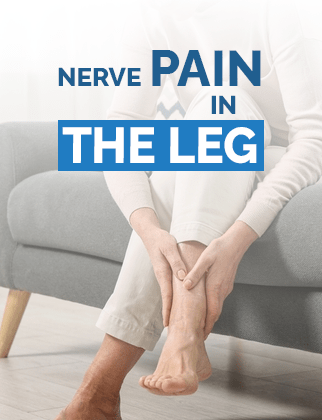

Nerve Pain in the Leg: Causes, Symptoms, and Treatment
Introduction
Nerve pain in the leg can be a debilitating condition that affects daily activities and overall quality of life. It is often associated with burning, tingling, or shooting sensations, which can range from mild to severe. Understanding the causes of nerve pain in the leg and exploring effective treatment options is essential for relief and recovery.
About Us - The Spine Clinic
Welcome to The Spine Clinic, led by Dr. Priyank Patel, Co-Founder and Director of the renowned spine organization, We Are Spine. Dr Priyank Patel – Spine Specialist doctor in Mumbai , specialize in diagnosing, treating, and educating patients about spine and spinal cord conditions using advanced, conservative, and traditional techniques.
Explore comprehensive information on spine conditions, symptoms, and treatments on our website, or visit us for personalized care at one of Mumbai’s premiere institutions. Your spine health is our priority!
What is Nerve Pain in the Leg?
Nerve pain, or neuropathy, in the leg occurs due to damage, irritation, or compression of nerves in the lower limbs. This type of pain often manifests as sharp, shooting sensations, and it can be a sign of an underlying condition such as sciatica, diabetes, or a nerve injury.
Causes of Nerve Pain in the Leg
There are various nerve pain in leg causes, including:
- Sciatica: Compression or irritation of the sciatic nerve.
- Diabetic Neuropathy: Nerve damage due to prolonged high blood sugar levels.
- Injuries: Accidents or trauma that damage nerves in the leg.
- Peripheral Neuropathy: Damage to peripheral nerves, often due to an underlying disease or condition.
- Herniated Disc: Spinal issues causing nerve compression.
Symptoms of Nerve Pain in the Leg
Recognizing nerve pain in leg symptoms is key to seeking timely treatment. Common symptoms include:
- Tingling or “pins and needles” sensation.
- Sharp, shooting, or burning pain.
- Weakness or numbness in the leg.
- Difficulty standing, walking, or maintaining balance.

Diagnosis of Nerve Pain in the Leg
A healthcare provider will evaluate your symptoms and medical history to diagnose nerve pain. Diagnostic methods may include:
- Physical Examination: Assessing muscle strength, sensation, and reflexes.
- Imaging Tests: MRI or CT scans to identify nerve damage or spinal issues.
- Nerve Conduction Studies: Testing the electrical activity of nerves.
Treatment Options for Nerve Pain in the Leg
Effective nerve pain in legs treatment depends on the underlying cause. Treatment options include:
Lifestyle and Home Remedies
- Regular nerve pain in leg exercise such as gentle stretches and yoga to improve flexibility and reduce pain.
- Applying heat or cold packs to the affected area.
- Maintaining a healthy weight to reduce pressure on nerves.
Medications
- Over-the-counter pain relievers.
- Prescription medications like antidepressants or anticonvulsants for neuropathic pain.
Interventional Procedures
- Epidural steroid injections.
- Nerve blocks to provide temporary relief for nerve pain in leg.
Alternative Therapies
- Acupuncture and massage therapy.
- Mind-body practices like meditation to manage chronic pain.

Preventing Nerve Pain in the Leg
Preventive measures can reduce the risk of chronic nerve pain in leg:
- Manage chronic conditions such as diabetes.
- Stay active with regular physical activity.
- Avoid prolonged sitting or poor posture.
When to See a Doctor
Seek medical attention if:
- Pain becomes severe or persistent.
- Numbness or weakness worsens.
- Daily activities are significantly affected.
Conclusion
Understanding and addressing nerve pain in the leg is essential for restoring mobility and comfort. By identifying the underlying nerve pain in leg causes and pursuing the right treatments, you can achieve long-term nerve pain in leg relief and improved quality of life.
Contact Dr Priyank Patel – Spine Specialist doctor in mumbai if you have any symptoms regards to nerve pain or back pain.
Frequently Asked Questions
Gentle stretches, yoga, and low-impact activities are effective for nerve pain in leg exercise.
Common symptoms include tingling, burning sensations, and weakness in the leg.
Through physical exams, imaging tests, and nerve studies.
Medications, physical therapy, and interventional procedures can help manage chronic nerve pain in leg.
Staying active, managing chronic conditions, and maintaining proper posture can help prevent nerve pain.
